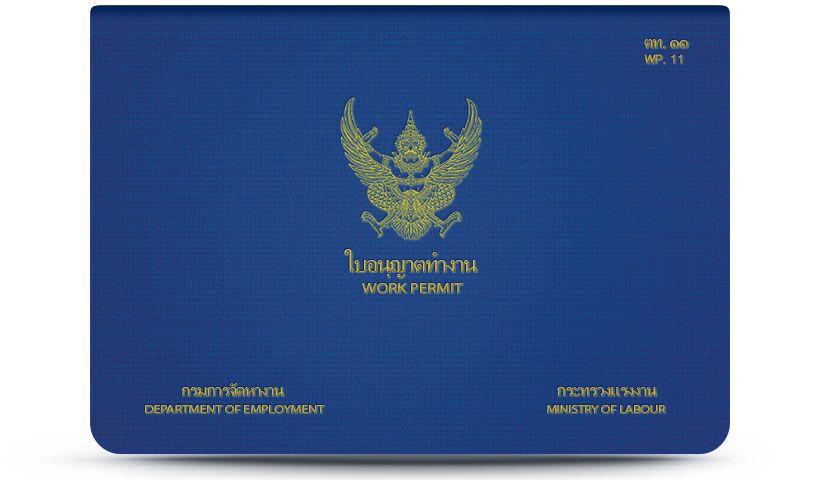Thailand Work Permit
A Thailand Work Permit is an official document issued by the Thai Ministry of Labour that allows a foreign national to legally work in Thailand. It outlines the specific job, employer, and work location authorized for the foreign worker, ensuring compliance with Thai labor laws.
Over the past two decades, Thailand has seen a steady increase in the number of foreigners entering the country. With its vibrant culture, thriving economy, and picturesque landscapes, Thailand has become both a top tourist destination and a land of opportunity. People from across Asia, Europe, and beyond continue to arrive — some drawn by leisure and adventure, but many in search of career prospects and a better life. As a result, foreign nationals have increasingly become part of Thailand’s commercial and professional landscape.
This growing foreign presence, particularly in urban business centers, eventually caught the attention of Thai authorities. The noticeable expansion of foreign roles in local businesses led to concerns over labor market balance and national interest. In response, the Thai government introduced stricter regulations, including legal measures and bilateral agreements, to control the influx and manage foreign involvement in the domestic economy.
Despite these efforts, challenges remain. A common issue has been the misuse of tourist visas by foreigners — commonly referred to as “falangs” — who enter the country for travel but end up seeking employment. Many have taken advantage of visa runs, briefly leaving the country and re-entering with renewed stays, allowing them to work without proper authorization. This loophole has complicated the government’s efforts to regulate foreign labor and ensure legal compliance.
Obtaining Proper Documents for Thailand Work Permit
Tourists are not allowed to work in Thailand. If they want to, they need to have their visa changed into a Non-Immigrant B Visa. This visa is typically the one issued to foreigners so they could engage in business or employment purposes inside Thailand. It comes on 90-day single entry, or on 1-year multiple entry. They could apply for this visa in the Thai embassy/consulate in their country of origin, or if it should happen that they are in Thailand already, they can apply for the visa in the immigration department.
Another important document is the Thai Work Permit. The Work Permit is the document that determines a foreign employee’s nature of work, length of employment, and some of his basic information like who’s he working for or where is he staying at. (See Siam Legal’s Work Permit Application page here.) Practically, a falang (even if he is a non-immigrant B visa holder) is prohibited to work in Thailand without this document. In order to apply for a Thailand work permit, one must already be in possession of a non-immigrant B visa. And like a visa, a work permit is also extendable as much as cancellable on certain conditions.
Prohibited Types of Work
The Thai government categorized jobs to determine which are ok and which are not for foreigners who wanted to work inside the country. They worry that foreigners will grab the jobs away from the locals, and so they deemed some jobs as exclusive for the thai people only.
However, all the businesses outside these categories are exempted from prohibition. Listed below are the prohibited work categories for a foreigner to engage into:
Category A:
- Agriculture: rice farming, salt farming;
- Service Business: accounting, farming animals, architecture, hair dressing, barber & beautician industry, advertising, brokerage & auctioning, building industry;
- Commercial Business: land trade, internal trade in local agricultural products
Category B:
- Agriculture Business: silkworm raising, husbandry, timber & fishing, floral and cultivation;
- Industrial & Handicraft: Rice milling, flour, sugar, alcohol & non-alcoholic drinks, ice cream, pharmaceuticals, wood carving, manufacturing of garments, shoes, furniture, jewelry, printing and newspaper publishing, silk industry;
- Commercial: all retailing industries not mention in category c, selling of foods, drinks, antiques & fine arts;
- Service Industry: Hotel, tour agency, photography, laundry service & dress making;
- Utility Services: water, electricity, land and transportation
Category C:
- Anything not in A or B
On the other hand, foreigners are allowed to engage in export, wholesale trading not mentioned in cat. a and b, retailing of machinery, equipment, tools, manufacturing of animal feeds, textiles, glass wares and ceramics. Selling commodities that promotes Thai tourism is also allowable. When applying for a Thailand work permit, make it sure that the job description you are putting up is not considered prohibited, else you wont get to see your work permit anytime soon.
Obligations of a Foreign Employee
The checklist for the foreign worker does not end on the prohibited types of work. In fact, it only begins upon obtaining the work permit. The Work Permit is a thin booklet purposely made to be carried by its owner. The falang should keep the booklet with him at all times, especially at work. He/she should perform the work as stated in the work permit, and in no circumstances he/she should perform other functions besides the one declared on the document.
In the event of changing address, he/she must apply for revisions. If the work permit is lost or damaged, he/she must report it to the labor department immediately. The document would be replaced by a new one. Most of all, upon resignation of work the document should be returned to the labor department within 7 days.
It is very important to note that failure to act on any of the regulations mentioned above is punishable by fines, or worst, detention and imprisonment. Thai authorities are very strict when it comes to violations and the law in general. Trust me, you don’t want to be on the receiving end. After all, nobody has been at loss by just following simple guidelines & regulations in a country where the west meets the east.



































